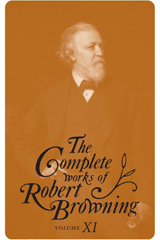
In seventeen volumes, copublished with Baylor University, this acclaimed series features annotated texts of all of Robert Browning’s known writing. The series encompasses autobiography as well as influences bearing on Browning’s life and career and aspects of Victorian thought and culture.
Volume XI of The Complete Works of Robert Browning contains two strikingly disparate long poems from the 1870s, Fifine at the Fair and Red Cotton Night-Cap Country. In Fifine at the Fair, Browning creates an idiosyncratic version of the Don Juan figure, a distinctly post-Romantic and intellectual Don Juan who derives little from any literary predecessor. The legendary character is realized in a modern French setting, the village of Pornic, a favorite vacation spot for Browning. The poem is a sustained exercise in self-justification and casuistry, with Don Juan persuading himself that he can reconcile his love of his wife with his carnal love for a gipsy girl.
Though Red Cotton Night-Cap Country is similarly concerned with a struggle between spirit and flesh, the poem is entirely based in contemporary events. Using newspaper accounts and legal documents, Browning tells the strange and shocking tale of a rich and devout Frenchman who throws himself from the roof of his chateau, convinced that heaven will deliver him from death. Upon the question of his sanity hinges the disposition of his considerable estate, and the poet traces the claims and counterclaims to their settlement in court only a few months before he wrote the poem.
As always in this series of critical editions, a complete record of textual variants is provided, as well as extensive explanatory notes.

The definitive English edition of the “Father of Medicine.”
This is the eleventh and final volume in the Loeb Classical Library’s complete edition of Hippocrates’ invaluable texts, which provide essential information about the practice of medicine in antiquity and about Greek theories concerning the human body. Here, Paul Potter presents the Greek text with facing English translation of Diseases of Women 1 and 2, which represent the most extensive accounts in the Hippocratic collection of female reproductive life, the pathological conditions affecting the female reproductive organs, and their proper terminology and recommended treatments. A lexicon of therapeutic agents is included for reference.
The works available in the Loeb Classical Library edition of Hippocrates are:
Volume I: Ancient Medicine. Airs, Waters, Places. Epidemics 1 and 3. The Oath. Precepts. Nutriment.
Volume II: Prognostic. Regimen in Acute Diseases. The Sacred Disease. The Art. Breaths. Law. Decorum. Dentition.
Volume III: On Wounds in the Head. In the Surgery. On Fractures. On Joints. Mochlicon.
Volume IV: Nature of Man. Regimen in Health. Humors. Aphorisms. Regimen 1–3. Dreams.
Volume V: Affections. Diseases 1–2.
Volume VI: Diseases 3. Internal Affections. Regimen in Acute Diseases.
Volume VII: Epidemics 2 and 4–7.
Volume VIII: Places in Man. Glands. Fleshes. Prorrhetic 1–2. Physician. Use of Liquids. Ulcers. Haemorrhoids and Fistulas.
Volume IX: Anatomy. Nature of Bones. Heart. Eight Months’ Child. Coan Prenotions. Crises. Critical Days. Superfetation. Girls. Excision of the Fetus. Sight.
Volume X: Generation. Nature of the Child. Diseases 4. Nature of Women. Barrenness.
Volume XI: Diseases of Women 1–2.

History and Philosophy of Modern Mathematics was first published in 1988. Minnesota Archive Editions uses digital technology to make long-unavailable books once again accessible, and are published unaltered from the original University of Minnesota Press editions.
The fourteen essays in this volume build on the pioneering effort of Garrett Birkhoff, professor of mathematics at Harvard University, who in 1974 organized a conference of mathematicians and historians of modern mathematics to examine how the two disciplines approach the history of mathematics. In History and Philosophy of Modern Mathematics, William Aspray and Philip Kitcher bring together distinguished scholars from mathematics, history, and philosophy to assess the current state of the field. Their essays, which grow out of a 1985 conference at the University of Minnesota, develop the basic premise that mathematical thought needs to be studied from an interdisciplinary perspective.
The opening essays study issues arising within logic and the foundations of mathematics, a traditional area of interest to historians and philosophers. The second section examines issues in the history of mathematics within the framework of established historical periods and questions. Next come case studies that illustrate the power of an interdisciplinary approach to the study of mathematics. The collection closes with a look at mathematics from a sociohistorical perspective, including the way institutions affect what constitutes mathematical knowledge.
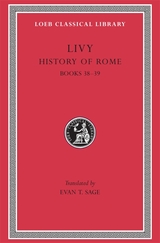
Livy (Titus Livius), the great Roman historian, was born at or near Patavium (Padua) in 64 or 59 BCE; he may have lived mostly in Rome but died at Patavium, in 12 or 17 CE.
Livy's only extant work is part of his history of Rome from the foundation of the city to 9 BCE. Of its 142 books, we have just 35, and short summaries of all the rest except two. The whole work was, long after his death, divided into Decades or series of ten. Books 110 we have entire; books 1120 are lost; books 2145 are entire, except parts of 41 and 4345. Of the rest only fragments and the summaries remain. In splendid style Livy, a man of wide sympathies and proud of Rome's past, presented an uncritical but clear and living narrative of the rise of Rome to greatness.
The Loeb Classical Library edition of Livy is in fourteen volumes. The last volume includes a comprehensive index.

Rome, from the beginning.
Livy (Titus Livius), the great Roman historian, was born at Patavium (Padua) in 64 or 59 BC, where after years in Rome he died in AD 12 or 17.
Livy’s history, composed as the imperial autocracy of Augustus was replacing the republican system that had stood for over five hundred years, presents in splendid style a vivid narrative of Rome’s rise from the traditional foundation of the city in 753 or 751 BC to 9 BC and illustrates the collective and individual virtues necessary to achieve and maintain such greatness.
Of its 142 books, conventionally divided into pentads and decades, we have 1–10 and 21–45 complete, and short summaries (periochae) of all the rest except 41 and 43–45; 11–20 are lost, and of the rest only fragments and the summaries remain.
The fourth decade comprises two recognizable pentads: Books 31–35 narrate the Second Macedonian War (200–196) and its aftermath (Rome’s growing hegemony over Greece and tension with Antiochus III, the Seleucid ruler of the Near East), then Books 36–40 the years from 191 to 180, when Rome crushed and shrank Antiochus’ empire to extend and consolidate her mastery over the Hellenistic states. Also included are detailed narratives of Rome’s domestic politics and society, and of her western wars.
This edition of the fourth decade, which replaces the original Loeb edition by Evan T. Sage, offers a text based on Briscoe’s edition, a fresh translation, and ample annotation fully current with modern scholarship.
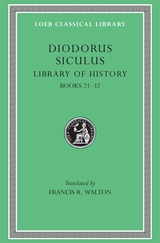
Remains of a universal chronicle.
Diodorus Siculus, Greek historian of Agyrium in Sicily (ca. 80–20 BC), wrote forty books of world history, called Library of History, in three parts: mythical history of peoples, non-Greek and Greek, to the Trojan War; history to Alexander’s death (323 BC); history to 54 BC. Of this we have complete Books 1–5 (Egyptians, Assyrians, Ethiopians, Greeks) and Books 11–20 (Greek history 480–302 BC); and fragments of the rest. He was an uncritical compiler, but used good sources and reproduced them faithfully. He is valuable for details unrecorded elsewhere, and as evidence for works now lost, especially writings of Ephorus, Apollodorus, Agatharchides, Philistus, and Timaeus.
The Loeb Classical Library edition of Diodorus Siculus is in twelve volumes.
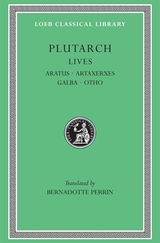
Comparative biographies of distinguished Greeks and Romans.
Plutarch (Plutarchus), ca. AD 45–120, was born at Chaeronea in Boeotia in central Greece, studied philosophy at Athens, and, after coming to Rome as a teacher in philosophy, was given consular rank by the emperor Trajan and a procuratorship in Greece by Hadrian. He was married and the father of one daughter and four sons. He appears as a man of kindly character and independent thought, studious and learned.
Plutarch wrote on many subjects. Most popular have always been the forty-six Parallel Lives, biographies planned to be ethical examples in pairs (in each pair, one Greek figure and one similar Roman), though the last four lives are single. All are invaluable sources of our knowledge of the lives and characters of Greek and Roman statesmen, soldiers, and orators. Plutarch’s many other varied extant works, about sixty in number, are known as Moralia or Moral Essays. They are of high literary value, besides being of great use to people interested in philosophy, ethics, and religion.
The Loeb Classical Library edition of the Lives is in eleven volumes.
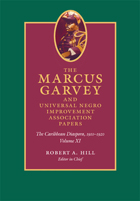
Praise for the Previous Volumes:
“The Marcus Garvey and Universal Negro Improvement Association Papers will take its place among the most important records of the Afro-American experience. . . . ‘The Marcus Garvey Papers’ lays the groundwork for a long overdue reassessment of Marcus Garvey and the legacy of racial pride, nationalism and concern with Africa he bequeathed to today’s black community.”—Eric Foner, the New York Times Book Review
“Until the publication of The Marcus Garvey and Universal Negro Improvement Association Papers, many of the documents necessary for a full assessment of Garvey’s thought or of his movement’s significance have not been easily accessible. Robert A. Hill and his staff . . . have gathered over 30,000 documents from libraries and other sources in many countries. . . . The Garvey papers will reshape our understanding of the history of black nationalism and perhaps increase our understanding of contemporary black politics.”—Clayborne Carson, the Nation
“Now is our chance, through these important volumes, to finally begin to come to terms with the significance of Garvey’s complex, fascinating career and the meaning of the movement he built.”—Lawrence W. Levine, the New Republic
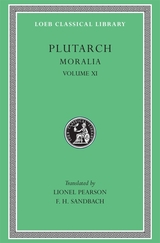
Eclectic essays on ethics, education, and much else besides.
Plutarch (Plutarchus), ca. AD 45–120, was born at Chaeronea in Boeotia in central Greece, studied philosophy at Athens, and, after coming to Rome as a teacher in philosophy, was given consular rank by the emperor Trajan and a procuratorship in Greece by Hadrian. He was married and the father of one daughter and four sons. He appears as a man of kindly character and independent thought, studious and learned.
Plutarch wrote on many subjects. Most popular have always been the forty-six Parallel Lives, biographies planned to be ethical examples in pairs (in each pair, one Greek figure and one similar Roman), though the last four lives are single. All are invaluable sources of our knowledge of the lives and characters of Greek and Roman statesmen, soldiers and orators. Plutarch’s many other varied extant works, about sixty in number, are known as Moralia or Moral Essays. They are of high literary value, besides being of great use to people interested in philosophy, ethics, and religion.
The Loeb Classical Library edition of the Moralia is in fifteen volumes, volume XIII having two parts. Volume XVI is a comprehensive Index.
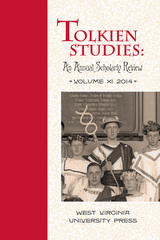
READERS
Browse our collection.
PUBLISHERS
See BiblioVault's publisher services.
STUDENT SERVICES
Files for college accessibility offices.
UChicago Accessibility Resources
home | accessibility | search | about | contact us
BiblioVault ® 2001 - 2025
The University of Chicago Press









